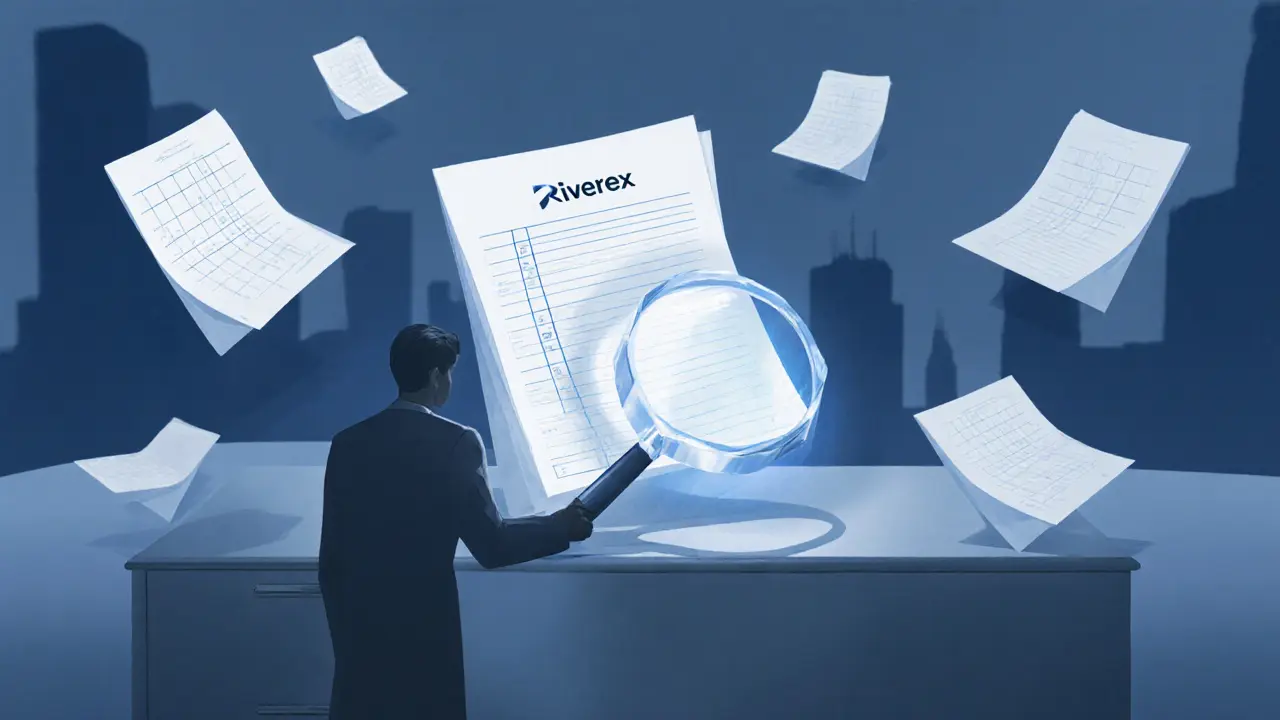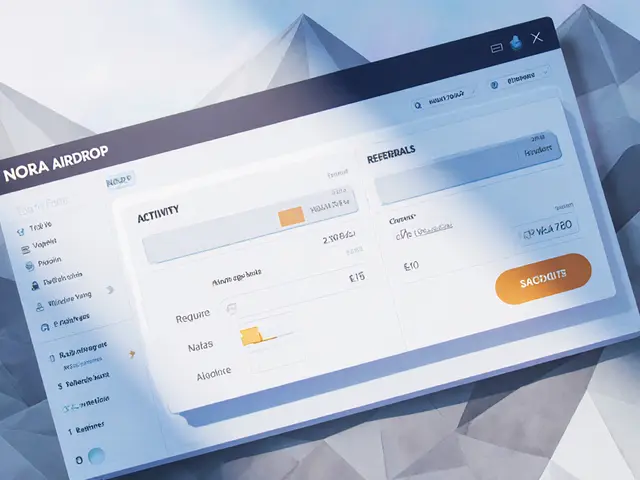Riverex Due Diligence Checker
This tool helps you assess whether Riverex meets essential due diligence criteria. Check each box below based on your findings:
Risk Assessment Result
When you start hunting for a place to buy or store Bitcoin, the name Riverex appears in a handful of forum threads and social posts, promising low fees and fancy security tools. The problem? There’s barely any public record of a registered exchange called Riverex. In this Riverex crypto exchange review, we piece together what’s real, what’s missing, and how the platform stacks up against a well‑known competitor-River Financial a US‑based Bitcoin‑only exchange with documented security and compliance credentials. By the end of the article you’ll know exactly what questions to ask, which red flags to watch, and whether Riverex deserves a spot in your wallet.
TL;DR - Quick Takeaways
- Riverex leaves almost no paper trail; no corporate registration, no audited security reports, and no clear jurisdiction.
- River Financial openly shares SOCII compliance, FDIC‑insured USD holdings, and a monthly Proof of Reserves audit.
- The only security feature specifically tied to Riverex is a vague “enhanced protection” claim; River Financial offers the proven ForceField multi‑layer withdrawal limit system launched in Jan2025.
- If you value transparency, stick with exchanges that publish third‑party audit results and have a clear regulatory footprint.
- Do a thorough due‑diligence checklist before depositing any funds into an unverified platform.
What Is Riverex, Really?
All reputable crypto‑exchange reviews start by confirming the company’s legal existence-registration number, headquarters, licensing authority. A search of U.S. state registries, the EU’s financial services database, and the FCA’s list returns no match for a firm named Riverex. The sole mentions are scattered across Reddit threads and a few promotional landing pages that lack a privacy policy, terms of service, or a verifiable corporate address.
Because the information is so thin, many users wonder if Riverex is simply a re‑brand of River Financial or a completely new, possibly offshore, operation. The evidence leans toward the latter: River Financial openly advertises its Ohio headquarters, its partnership with Lead Bank a FDIC‑insured institution that backs USD deposits up to $250,000, and its monthly Proof of Reserves PDFs. Riverex offers none of these public credibility signals.
Security-The Core Concern for Any Exchange
Crypto assets are valuable precisely because they’re irreversible. A single breach can wipe out years of savings. To evaluate security, we focus on three pillars: custody architecture, authentication layers, and transparent audits.
Custody Architecture
- Cold storage keeps private keys offline, away from internet‑connected servers-the gold standard for protecting large balances.
- River Financial stores 100% of client Bitcoin in multisig cold wallets that never touch the internet after purchase.
- Riverex’s website mentions “offline storage” but provides no technical details, third‑party audit, or proof of reserves.
Authentication Layers
- Standard 2‑factor authentication (2FA) via authenticator apps.
- Device‑verification alerts for new logins.
- River Financial adds a 5‑day deactivation delay for its ForceField withdrawal‑limit feature that can block unauthorized transfers.
- Riverex merely states “enhanced security” without describing 2FA options, device checks, or withdrawal safeguards.
Transparency Audits
- River Financial publishes a monthly Proof of Reserves report that cryptographically verifies the amount of Bitcoin held on behalf of users. Independent auditors sign off on the figures.
- No publicly available audit or proof‑of‑reserves page exists for Riverex, which is a major red flag.
Regulatory Compliance - Why It Matters
Operating under a recognized regulatory regime means the exchange must meet anti‑money‑laundering (AML) standards, submit regular financial statements, and often carry insurance for custodial assets.
- SOCII a certification that validates a company’s internal controls over security, availability, processing integrity, confidentiality, and privacy - River Financial is SOCII compliant, a credential that only a handful of crypto platforms hold.
- FDIC insurance via Lead Bank protects USD balances up to $250,000, giving users a safety net that traditional banks provide.
- Riverex offers no mention of SOCII, FINCEN registration, or any banking partnership, leaving its compliance posture unclear.

Feature Comparison - Riverex vs. River Financial
| Feature | Riverex | River Financial |
|---|---|---|
| Supported assets | Claims Bitcoin only, no public list | Bitcoin only, clearly listed |
| Custody model | Vague offline storage statement | 100% multisig cold storage, audited monthly |
| Withdrawal protection | “Enhanced security” - no specifics | ForceField weekly withdrawal limits and 5‑day deactivation delay |
| Regulatory status | None disclosed | SOCII compliant, FDIC‑insured USD via Lead Bank |
| Transparency | No public audit or proof‑of‑reserves | Monthly Proof of Reserves, signed audits |
| Customer support | Live chat only, limited hours | 24/7 email, phone, and in‑app chat |
User Experience - What Traders Actually See
First impressions matter. River Financial’s mobile app is clean, loads in under two seconds, and groups core actions-Buy, Sell, Transfer-on a single screen. The onboarding flow asks for basic KYC info, checks against public sanctions lists, and then lets users fund their account via ACH or wire.
Riverex’s web portal looks modern but suffers from broken links in the FAQ section, missing SSL certificate details in some browsers, and a “maintenance mode” banner that appears intermittently. Users report longer verification times-often up to 10 business days-without clear explanations.
From a practical standpoint, the smoother UX combined with transparent fee breakdowns (River Financial charges 0.5% on trades, 0.2% on withdrawals) makes the known platform a safer choice for newcomers and seasoned traders alike.
Red Flags & Due‑Diligence Checklist
When an exchange’s public footprint is thin, treat every claim with skepticism. Below is a step‑by‑step checklist you should run before wiring any crypto to Riverex or a similarly obscure service.
- Verify corporate registration: Search the jurisdiction’s business registry for the exact legal name.
- Check for third‑party audits: Look for SOCII, ISO27001, or independent proof‑of‑reserves.
- Confirm banking partnerships: A genuine exchange will disclose the bank that holds fiat deposits and the insurance coverage limits.
- Test withdrawal limits: Make a small test withdrawal to see if the platform imposes hidden fees or unexpected delay.
- Review security features: Ensure 2FA, device alerts, and withdrawal safeguards are spelled out, not just buzz‑worded.
- Read user reviews on reputable forums (Reddit, Bitcointalk) and note recurring complaints about support or fund accessibility.
If any of these steps return a blank, proceed with extreme caution or avoid the platform altogether.
Final Verdict - Is Riverex Worth Your Money?
Based on the evidence (or lack thereof), Riverex looks more like a marketing façade than a fully regulated, security‑first exchange. Its absence of verifiable corporate data, missing audits, and vague security claims contrast sharply with River Financial’s transparent operations, proven ForceField withdrawal‑limit system, SOCII compliance, and FDIC‑insured fiat holdings. If you value peace of mind and want to avoid the nightmare of a lost private key or a hacked platform, stick with exchanges that publish their Proof of Reserves, have clear regulatory ties, and offer documented security layers.
That said, the crypto landscape evolves quickly. Should Riverex release audited reports, a registered office, and concrete security specs, a re‑evaluation would be warranted. Until then, the safest play is to keep your Bitcoin in a hardware wallet you control or use a well‑known, compliant exchange.
Frequently Asked Questions
Is Riverex a legitimate crypto exchange?
There is no public record of a registered company called Riverex, no audited security reports, and no clear regulatory affiliation. Those gaps make the platform’s legitimacy highly questionable.
How does River Financial’s ForceField protect users?
ForceField lets users set weekly withdrawal caps and enforces a five‑day deactivation delay if the feature is turned off. Even if an attacker gains access, only the amount within the weekly limit is at risk.
What is a Proof of Reserves report?
It’s a cryptographic audit that shows an exchange holds the exact amount of cryptocurrency it claims on behalf of its users. Independent auditors sign the report, providing transparency.
Can I trust an exchange that only offers “enhanced security” without details?
No. Vague language usually hides the fact that the platform lacks concrete safeguards like 2FA, multisig cold storage, or withdrawal limits. Look for specific features and third‑party verification.
What should I do if I decide to test Riverex with a small deposit?
Deposit the smallest amount you’re willing to lose, monitor the withdrawal process, and check if the platform provides any audit logs or proof‑of‑reserves after the transaction. If anything feels off, withdraw immediately and avoid larger deposits.





karsten wall
When dissecting an emergent exchange, the due‑diligence matrix must encompass corporate ontogeny, cryptographic custody topology, and regulatory compliance vectors. The absence of a verifiable registration number for Riverex collapses the foundational corporate governance layer, eroding any confidence in its operational legitimacy. Moreover, without a publicly signed SOC II or ISO 27001 audit, the risk surface expands exponentially, making threat modelling an exercise in speculation. The paucity of proof‑of‑reserves data further destabilises the liquidity assurance framework, rendering the platform vulnerable to solvency opacity. In essence, the confluence of these omissions positions Riverex within a high‑entropy risk quadrant that prudent custodians should avoid.
Rahul Dixit
The whole Riverex charade is a Trojan horse for Western financial domination!
Michael Ross
The checklist you outlined aligns well with industry best practices; a clear corporate identity, third‑party audit transparency, and a robust cold‑storage regime are non‑negotiable pillars for any trustworthy platform.
Krystine Kruchten
It’s heartening to see that the community is rallying around objective due‑diligence standards rather than getting swept up by marketing hype. First, a registered legal entity provides a concrete anchor for regulatory oversight and consumer recourse. Second, third‑party security audits such as SOC II, ISO 27001, or independent proof‑of‑reserves reports furnish verifiable evidence that the exchange’s internal controls are not merely aspirational. Third, a transparent fee schedule eliminates the hidden‑cost syndrome that often erodes user trust over time. Fourth, multi‑factor authentication combined with device‑level alerts creates a layered defense against credential compromise. Fifth, the implementation of withdrawal‑limit mechanisms-akin to River Financial’s ForceField-mitigates the impact of any potential breach by capping exposure. Sixth, a partnership with an FDIC‑insured banking institution offers a safety net for fiat holdings, preserving capital in the event of insolvency. Seventh, responsive customer support, available across multiple channels, ensures that users can resolve issues swiftly. Eighth, clear jurisdictional disclosure subjects the exchange to the legal frameworks that enforce consumer protection statutes. Ninth, regular public communication about system upgrades and incident responses builds a culture of transparency. Tenth, community‑driven governance, where stakeholders can voice concerns and vote on protocol changes, democratizes the platform’s evolution. Eleventh, an open‑source codebase invites external scrutiny, reinforcing security through collective inspection. Twelfth, comprehensive KYC/AML procedures align the platform with global anti‑money‑laundering mandates, safeguarding the ecosystem from illicit activity. Thirteenth, real‑time monitoring dashboards provide users with visibility into network health and transaction status. Fourteenth, escrow services for peer‑to‑peer trades add an extra layer of trust. Fifteenth, educating users about best security hygiene empowers them to become the first line of defense. When an exchange ticks most of these boxes, the risk profile shifts dramatically towards low‑risk, making it a viable candidate for both novice and seasoned traders.
Mangal Chauhan
Appreciate the comprehensive breakdown; it reinforces why regulatory clarity and audit transparency are non‑negotiable. 🌟 For anyone still unsure, start by confirming the entity’s registration number in the jurisdiction’s corporate registry, then verify the audit signatures on the Proof‑of‑Reserves PDF. Only after those steps should you contemplate a larger deposit.
Iva Djukić
From a systemic perspective, the differential between Riverex and River Financial can be modelled as a variance in trust coefficients across three vectors: custodial integrity, regulatory adherence, and operational transparency. The lack of a publicly accessible custodial architecture diagram for Riverex essentially yields a zero‑knowledge proof scenario, whereas River Financial provides a verifiable multisig cold‑storage schema, thereby assigning a high confidence score. In regulatory terms, Riverex’s silence on jurisdiction mirrors a black‑box entity, amplifying compliance risk. Operational transparency, quantified via frequency of published audit logs, further skews the risk function. Consequently, any risk‑adjusted return calculation must heavily discount Riverex’s projected yields.
Darius Needham
Given the analytical model you presented, could you elaborate on how the confidence interval for custodial integrity might be empirically validated without direct audit access?
WILMAR MURIEL
While we lack direct audit documents, indirect signals can be synthesized: monitoring blockchain address clustering to infer cold‑storage usage, observing withdrawal latency patterns, and cross‑referencing domain WHOIS data for corporate footprints. These heuristics, when combined, form a probabilistic confidence layer that, although not a substitute for a formal audit, offers a pragmatic gauge for user risk assessment.
carol williams
The narrative surrounding Riverex reads like a modern myth, complete with shadowy origins and promises of untold wealth, yet it lacks any verifiable substrate to substantiate its claims.
jit salcedo
Ah, the siren song of unregulated cryptic markets-where the only lighthouse is the flicker of unverified hype, casting long, eerie shadows over the very notion of trust.
Lisa Strauss
Sticking to platforms with proven track records not only safeguards assets but also bolsters confidence for newcomers stepping into the crypto space.
Latoya Jackman
Indeed, transparency catalyses adoption; users are more likely to engage when they can verify holdings and policies.
Megan King
Totally agree-when the exchange shows its cards early, it builds a community vibe that's both safe and welcoming.
Ron Hunsberger
From a practical standpoint, start with a hardware wallet for long‑term storage; use a reputable exchange solely for liquidity events. This dual‑strategy minimizes exposure to platform‑specific outages while preserving control over private keys.
Thiago Rafael
The premise that Riverex operates without disclosed audits or regulatory ties is fundamentally flawed; such opaqueness contradicts the core tenets of financial stewardship and inevitably erodes stakeholder confidence.